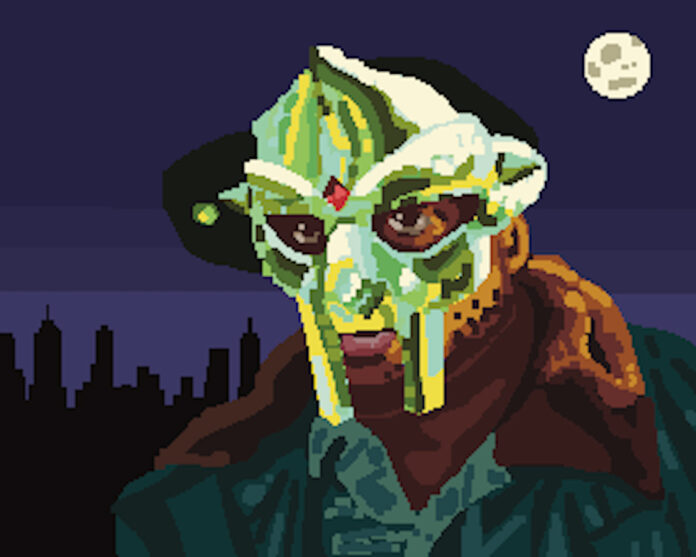Jasmine Dumile announced on the last day of 2020 that her husband, Daniel Dumile, more commonly known as MF DOOM, passed away this past Halloween at the age of 49. The announcement was made on the rapper’s Instagram, with no official cause of death. MF DOOM was a wordsmith and a champion of underground rap. Many knew the artist for his dizzying lyrical ability and signature mask.
The son of two immigrants, Dumile was born in London, England, and moved to Long Island, New York as a young child. There, he and his brother helped form the hip-hop group KMD in 1988. After releasing their debut album, “Mr. Hood” in 1991, Dumile’s brother was killed in a car accident. That tragedy, combined with KMD’s label shelving their second album, caused Dumile to disappear from the music industry. Dumile reappeared in 1997, rapping at open mics in Manhattan wearing a pair of tights on his head to protect his anonymity. He later changed the tights out for a mask reminiscent of Marvel’s Doctor Doom, the main villain of the Fantastic Four, and burst onto the scene with his debut album, “Operation: Doomsday” under the moniker MF DOOM. From there, MF DOOM cemented himself as an underground legend with albums such as “Mm.. Food,” “Madvillainy” and his 10 volume collection “Metal Fingers Presents: Special Herbs.” In addition, he released several projects under multiple other aliases, including King Geedorah and Viktor Vaughan.
The announcement of his sudden death prompted the public as well as well-known rappers and artists to air their grief on Twitter shortly after.
“Rest In Peace to a true pioneer,” rapper JPEGMAFIA tweeted. “I hate hearing this.” In another tweet, he stated “I wanted to be like DOOM ALLCAPSNOSPACES. A black weirdo I could look up to. I wish we could have met.”
Many who worked closely with MF DOOM described the greatness they witnessed.
“He was a massive inspiration to so many of us, changed things…” Radiohead’s Thom Yorke said, who had collaborated with MF DOOM in the past. “For me the way he put words was often shocking in its genius, using stream of consciousness in a way I’d never heard before.”
Rapper Q-Tip from A Tribe Called Quest also commented on his legacy.
“RIP to another Giant,” Q-Tip tweeted, referring to DOOM by using a popular descriptor; “your favorite MC’s [favorite] MC.”
These tweets indicate that MF DOOM garnered respect from other musicians over his career, and his music influenced rap in general. Several artists, such as The Weeknd, Ghostface Killah of Wu-Tang Clan, Aesop Rock, Danny Brown and Kenny Beats, cite MF DOOM as being a major influence in their own music and performing.
His impact goes far beyond the music industry. For people like Santiago Callejas Portillo (sophomore), MF DOOM’s music was a big part of growing up.
“I feel like at the age of 14, 15, that’s still a point in your life where you’re making a lot of memories,” Callejas Portillo said. “But his music has this characteristic that’s like nostalgia, in a way. So whenever I listen to his music, I feel like a sense of nostalgia.”
For others, such as theater professor Will Power, who spent much of his early career as a hip-hop artist, MF DOOM represented a break in the status quo.
“He was the first MC as far as I know that donned the mask pretty much all the time as MF DOOM,” Power said. “It’s like this character. It takes away who the person is so it’s nobody, but it also can be everybody or anybody.”
This character is one of the most iconic aspects of MF DOOM’s career. Dumile rarely ever made a public appearance without wearing his signature mask.
“A visual always brings a first impression,” Dumile said in an interview for the New Yorker. “But if there’s going to be a first impression I might as well use it to control the story. So why not do something like throw a mask on?”
But this mask was more than just a way to maintain anonymity; Dumile created an entire character out of MF DOOM, complete with a backstory that he would reference in his music. He intended this character to exist outside of himself, even going so far as to send other people on-stage to perform his shows as MF DOOM. While fans and critics despised this, Dumile saw it as the logical next step of the concept of MF DOOM, according to the same article. And many agree.
“One of his goals was to create a character that other people could perform,” Power said. “It didn’t fully fly in those hardcore hip-hop circles, but I think that’s really interesting. Being a theater artist as well, I really appreciate the theatrical nature of what he tried to do and what he did.”
MF DOOM was an impressive lyricist whose flow and rhymes were nearly unmatchable. He was your rapper’s favorite rapper. Yet, despite his sudden passing, fans like Callejas Portillo understand that MF DOOM’s impact on hip-hop remains far beyond his lifetime.
“Although it was shocking to find out that he died, I know that I wasn’t worried because MF DOOM is sort of like a feeling, you know?” Callejas Portillo said. “Like, yeah he’s a person, but he also created this, or really just mastered this sub-genre of underground rap. And it’s gonna be a sound forever.”
![]()































